|
Indian Cave
|
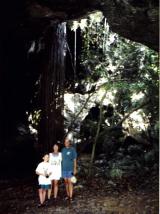
|
Indian Cave is located just off the road from Conch Bar to the ferry
landing. It's very open and airy. Only the recesses at the back wall are
dark. Roots from trees growing on the roof hang all the way to the floor
of the cave. A large white owl lives here.
|
|
Village Cave
|
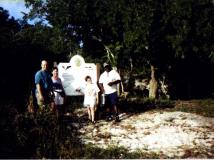
|
The caves of Middle Caicos are the largest above-water cave system in the
Caribbean. The largest is Village Cave which is a part of the National Park
system. There are several local tour guides available. We went in with
Hormel Harvey. Hormel also does other tours and has one of the two gas
stations on the island.
|
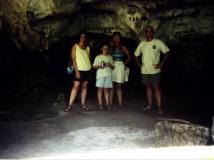
|
The cave opening is large and admits a lot of light. In fact much of the
front part of the cave is lit from openings in the hill side. Here we
stand just inside the entrance. Notice the graffiti from early in the
century.
|
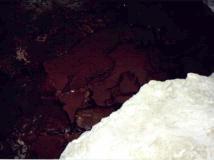
|
The cave is still active. The abundant rain of Middle Caicos filters
through the hill above. Here is a formation known as "Cave Bacon".
|
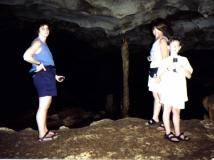
|
The area near the cave entrance is "split level". The walkways are on raised
levels (in some cases man-made) above the wet and active floor of the cave.
In the background is a nearly completed column. In only a few hundred
years it should reach the ceiling.
|
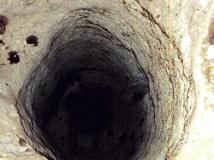
|
Bats live here. This is a vertical tube dissolved into the roof of the cave.
The many dark spots are roosting bats. Deeper into the cave is a room
where guano was mined. The original depth of the guano is indicated by a
dark line on the cave wall. In places, it was as much as 8 to 10 feet
deep.
|
|
A Cave With A View
|
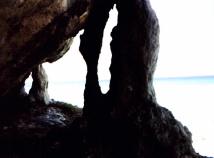
|
Hidden on the face of a cliff below Conch Bar is evidence of how the island
formed. Indian Cave and Village Cave, as well as countless others both
known and unknown, lie under ridges that parallel the north coast of the
island. The cliffs of the northwest coast are the remains of another
ridgeline. One might suspect that the cavelike openings at Hidden Beach
and near the Juniper Hole were once underground caves opened by the
encroaching sea. On this cliff, these columns, joined pairs of stalactites
and stalagmites, support this theory.
|













